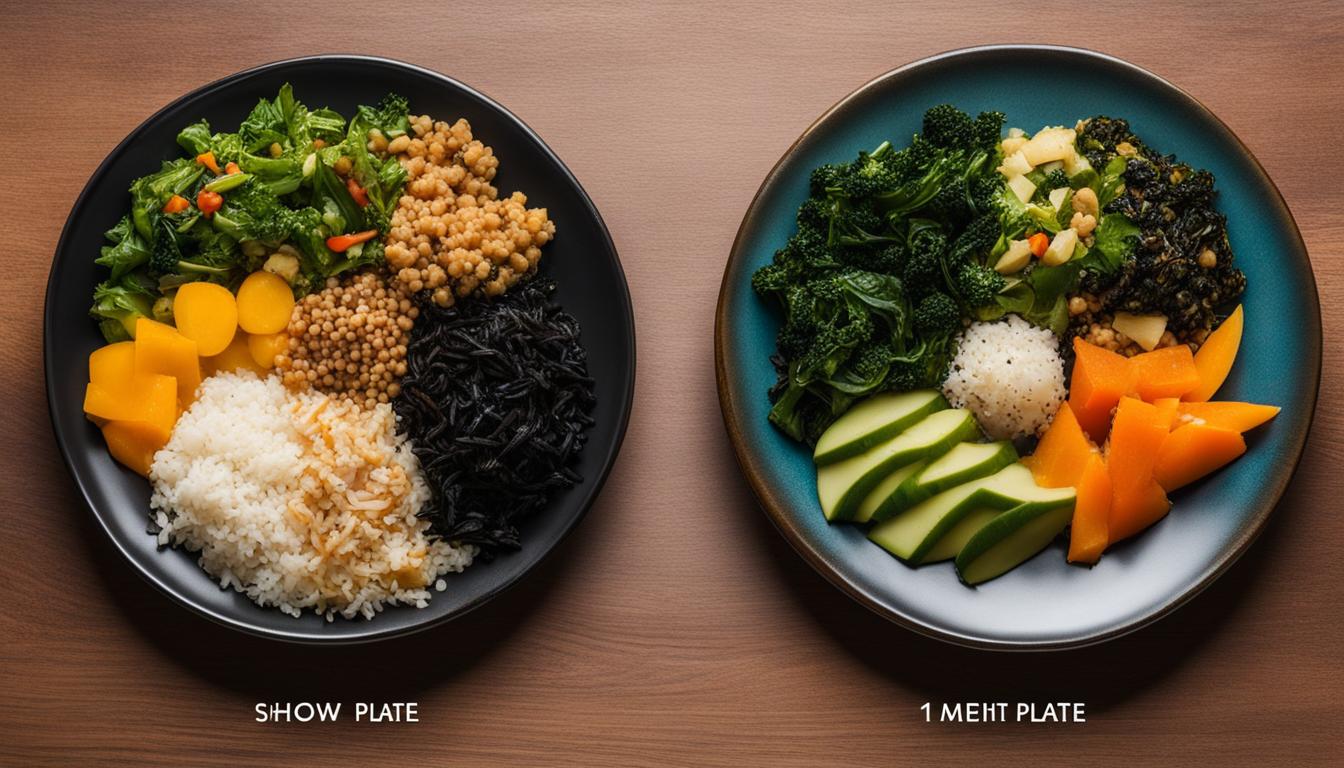Welcome to our article about the differences between a macrobiotic diet and a vegan diet! If you’ve ever wondered how these two plant-based eating plans compare, you’ve come to the right place. In this article, we will explore the key distinctions between a macrobiotic diet and a vegan diet, shedding light on their unique features and benefits.
Before we delve into the details, let’s start with a brief overview. A macrobiotic diet eliminates meat, fish, poultry, eggs, dairy products, and other animal-derived products. It also restricts the consumption of rennet, gelatin, collagen, and other animal proteins. On the other hand, a vegan diet excludes all animal products, both in terms of food consumption and lifestyle choices.
Now, let’s take a closer look at the specific differences between these two plant-based eating plans:
Key Takeaways:
- A macrobiotic diet eliminates meat, fish, poultry, eggs, dairy products, and other animal-derived products.
- A vegan diet excludes all animal products, both in terms of food consumption and lifestyle choices.
- The macrobiotic diet encourages the consumption of whole grains, vegetables, beans, and legumes while excluding certain vegetables, fruits, and anything spicy or processed.
- The vegan diet promotes a wide variety of plant-based foods and strictly avoids all animal-derived products and by-products.
- Both diets offer health benefits and align with plant-based lifestyles, but individual preferences, ethical beliefs, and health goals should be considered when choosing a diet.
The Similarities Between Macrobiotic and Vegan Diets
Both the macrobiotic and vegan diets share several similarities in terms of their dietary choices and lifestyle. These similarities contribute to their shared goal of promoting a plant-based lifestyle and overall well-being.
One of the key similarities between the two diets is the emphasis on consuming whole foods and minimizing the intake of processed foods. Both diets prioritize the consumption of fruits, vegetables, beans, and legumes, which are rich in essential nutrients such as vitamins, minerals, and fiber. By focusing on whole foods, both diets aim to provide the body with nourishment in its most natural form, supporting optimal health.
Another similarity between the macrobiotic and vegan diets is the exclusion of meat and animal flesh. Both diets eliminate the consumption of animal products, including meat, poultry, and fish, as well as by-products such as gelatin and collagen. By avoiding animal products, these diets promote ethical considerations regarding animal welfare and environmental sustainability.
Additionally, both the macrobiotic and vegan diets discourage the consumption of refined sugars and processed foods. Instead, they promote the consumption of unrefined, natural sweeteners and whole grains. This emphasis on minimizing processed foods helps to reduce the intake of artificial additives and preservatives, promoting a healthier and more balanced diet.
| Similarities Between Macrobiotic and Vegan Diets |
|---|
| Emphasis on whole foods and minimal processing |
| Exclusion of meat and animal flesh |
| Discouragement of refined sugars and processed foods |
The Differences Between Macrobiotic and Vegan Diets
When comparing the macrobiotic and vegan diets, it becomes evident that there are several key differences between the two. One of the main distinctions is the inclusion of fish and seafood in the macrobiotic diet, which is strictly excluded in the vegan diet. While the macrobiotic diet allows for the consumption of these animal products, the vegan diet eliminates all forms of animal-derived foods.
Another difference lies in the emphasis on specific food choices. The macrobiotic diet encourages the consumption of Asian vegetables, seaweed, and locally-grown fruits, while the vegan diet promotes a wider variety of plant-based foods. Additionally, the macrobiotic diet discourages the consumption of dairy, eggs, poultry, red meat, and certain vegetables and fruits, which may be included in a vegan diet.
To better understand the contrasts between these two diets, a table is provided below:
| Macrobiotic Diet | Vegan Diet |
|---|---|
| Includes fish and seafood | Excludes all animal products |
| Emphasizes Asian vegetables, seaweed, and locally-grown fruits | Promotes a wide variety of plant-based foods |
| Discourages dairy, eggs, poultry, red meat, and certain vegetables and fruits | Excludes all animal-derived products and by-products |
It is important to note that both diets have their own unique benefits and challenges. Individuals should consider their personal preferences, ethical beliefs, and health goals when choosing between the macrobiotic and vegan diets. Consulting with a registered dietitian or nutritionist can provide valuable guidance in ensuring that all nutritional needs are met.
Benefits of Macrobiotic and Vegan Diets
Both the macrobiotic and vegan diets offer numerous health benefits. The consumption of whole foods and minimal processing in both diets can lead to weight loss, improved digestion, increased energy levels, and reduced risk of chronic diseases. The inclusion of fruits, vegetables, beans, and legumes in both diets provides essential vitamins, minerals, and fiber.
One of the key benefits of the macrobiotic diet is its emphasis on balance and mindfulness. By practicing mindful eating and maintaining a positive mental outlook, individuals following a macrobiotic lifestyle may experience mental well-being and a greater sense of overall wellness.
The vegan diet, on the other hand, not only benefits individual health but also promotes animal welfare and reduces environmental impact. By excluding all animal products, vegans contribute to the ethical treatment of animals and help minimize the demand for animal farming, which is a leading cause of deforestation and greenhouse gas emissions.
| Macrobiotic Diet | Vegan Diet | |
|---|---|---|
| Key Focus | Whole grains, vegetables, beans, legumes | Plant-based foods, excluding all animal products |
| Exclusions | Dairy, eggs, poultry, red meat, certain vegetables and fruits, spicy or processed foods | All animal-derived products and by-products |
| Benefits | Weight loss, improved digestion, increased energy, mental well-being | Weight loss, reduced risk of chronic diseases, animal welfare, environmental sustainability |
| Considerations | May require careful meal planning to ensure nutritional balance | May require supplementation of certain nutrients like vitamin B12 |
When deciding between the macrobiotic and vegan diets, individuals should consider their personal preferences, ethical beliefs, and health goals. It is crucial to consult with a registered dietitian or nutritionist to ensure that all nutritional needs are met and to address any potential challenges that may arise from following either diet.
Conclusion
In conclusion, the macrobiotic and vegan diets offer distinct approaches to a plant-based lifestyle. Both diets prioritize whole foods and minimal processing, promoting overall health and well-being. However, they differ in terms of the inclusion of fish and seafood in the macrobiotic diet and the exclusion of all animal products in the vegan diet.
While the macrobiotic diet allows for the consumption of fish and seafood, the vegan diet strictly avoids all animal-derived products. The macrobiotic diet also emphasizes certain Asian vegetables, seaweed, and locally-grown fruits, while the vegan diet encourages a wide variety of plant-based foods.
When considering which diet to follow, it is important to align personal preferences, ethical beliefs, and health goals. Consulting with a registered dietitian or nutritionist can ensure that all nutritional needs are met. Whether choosing the macrobiotic or vegan diet, both offer numerous health benefits and contribute to a sustainable and compassionate lifestyle.
Ultimately, the decision between a macrobiotic and vegan diet is a personal one. Each individual can explore both options and determine which aligns best with their values and nutritional requirements. No matter which path is chosen, embracing a plant-based lifestyle is a powerful step towards improving personal health and making a positive impact on the planet.
FAQ
What is a macrobiotic diet?
A macrobiotic diet eliminates meat, fish, poultry, eggs, dairy products, and other animal-derived products. It also restricts the consumption of rennet, gelatin, collagen, and other animal proteins.
What is a vegan diet?
A vegan diet excludes the consumption of all animal products, including meat, fish, poultry, eggs, dairy products, and other animal-derived ingredients.
What is the main difference between a macrobiotic diet and a vegan diet?
The main difference is that the macrobiotic diet allows the consumption of fish and seafood, while the vegan diet excludes all animal products, including fish and seafood.
Can vegetarians follow a macrobiotic diet?
Yes, vegetarians can follow a macrobiotic diet by eliminating meat, fish, and poultry but still including dairy products and eggs.
Are there any health benefits to following a macrobiotic or vegan diet?
Yes, both diets offer numerous health benefits, including weight loss, improved digestion, increased energy levels, and reduced risk of chronic diseases.
Can a macrobiotic or vegan diet meet all nutritional needs?
It is important to consult with a registered dietitian or nutritionist to ensure that all nutritional needs are met when following either diet.
 Skip to main content
Skip to main content


